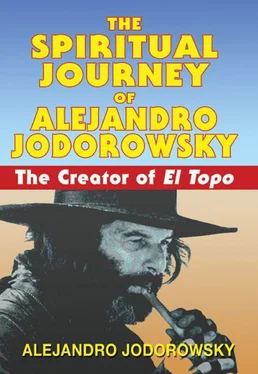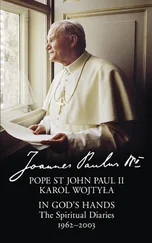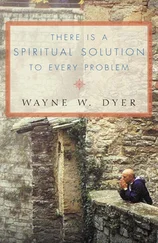On the enthusiastic recommendation of John Lennon, El Topo was bought and distributed in the United States and the rest of the world by Allen Klein, the president of a company called Apple, which distributed records by the Beatles and the Rolling Stones. Also on the recommendation of John Lennon, Klein wrote me a check for a million dollars for me to make any film I wished. This allowed me to film The Holy Mountain . The success of these two films pleased the producer but also excited his greed. He made me a big offer: the filming of The Story of O , a bestselling novel of sadomasochistic pornography, depicting beautiful women being humiliated in numerous ways. Klein had already secured some notable English investors who were excited about the project and was confident it would be a record blockbuster. The temptation was enormous. I accepted the invitation to go to London with him. In a tube-shaped hotel that looked like some sort of tower, the English producers were waiting to sign the contract. Before he went to meet with them, Klein promised me that he would emerge with a contract ready for me to sign. As soon as I did, I would receive immediately two hundred thousand dollars as an advance on my salary as director.
My heart was pounding. On one side of the balance: wealth and fame. On the other side: my artistic honor. After a half hour of anxious vacillation, I resolved the koan. I left the hotel at a run, took a plane back to New York, and called Michel Seydoux in France. He was a multimillionaire who had previously offered to produce a film of mine. I proposed Dune , and he accepted. In a few hours, my wife and I packed our bags and left with our children for Paris, without even leaving an address where Klein could contact me. His reaction was one of uncontrollable rage. A friend who was one of his employees told me that he had said, “Who does this traitor think he is? His artist’s vanity has caused me to lose millions of dollars. I’m going to lock the negatives of his films in a safe as of now, and until the day he dies, no one will ever see them.”
And this is exactly what he did — he called in all copies of my films from distributors around the world. Every time some film festival managed to get hold of a copy of El Topo or The Holy Mountain from a collector, Klein dispatched his lawyers and prevented the screening.
I was also consumed with hatred. I saw Klein as a cultural murderer, an accursed gangster, and a repugnant vulture who hoped for my death so that he could enrich himself with posthumous screenings. I was able to defend myself somewhat, because I had some video copies of my films. I gave them away for free to pirates in every country I visited. Although of poor quality, they managed to sell in Italy, Chile, Japan, Switzerland, Russia, and other countries for about thirty years. When the Internet came along, Klein used it to find the address of one of these pirates and threaten him with a lawsuit. Frightened, this man called me. I decided to assume responsibility for the “piracy” and defend myself legally. The trial began in France, and I was lucky to be accepted as a client by Maître Bitoun, a great lawyer who specializes in difficulties related to author’s rights. I felt like David challenging Goliath: Klein had already waged lawsuits against the Beatles, the Rolling Stones, and Phil Spector, and he won them all. Now he was suing me for millions of dollars in damages. If I lost, it would spell financial ruin for the rest of my life. I was shaking with fear when the trial began, but I reminded myself that feeling fear was normal; it didn’t mean I had to be a coward.
The discussions between my lawyer (a man afflicted with a muscular disorder that gave him a crippled walk and made it difficult for him to speak easily) and Klein’s top-notch English lawyers went on and on and on. Two years passed, and the battle was far from over. It was around this time, when it seemed it would drag on forever, that I received Marilyn Manson’s call about The Children of El Topo . Klein held all rights to this and any other prequels or sequels of El Topo . It was at this point that I realized that if I kept on fighting Klein, the project would never see the light of day. What could I do? Another koan. I picked up the telephone and called Klein’s son Jordi in New York.
“Our quarrel could drag on for ten years or more. Your family is wealthy, but your lawyers are costing you a fortune. They have an interest in dragging it out as long as possible. As for me, I’m not spending a penny, because my lawyer has agreed to work on a percentage. Wouldn’t it be better if we found a way to settle this out of court?”
“You’re right,” he answered. “Also, the younger generation is eager to see your films. Right now, I’m handling the DVD sector of our business. It would be great if we could make DVDs of your films available to a large public as soon as possible.”
“Then why don’t we try to meet and find a way out of this conflict?” I said.
“I agree — in fact, next week would be especially good, because my father and I will be in London, not far from you.”
The three hours on the Eurostar train from Paris to London seemed to last for centuries. I could not be sure of what might happen, nor could I imagine what it would be like to meet this monstrous enemy of mine. Thirty years of mutual hatred! Would we fall into insulting each other or even come to blows?
A taxi dropped me off at a centrally located hotel. Jordi came down to the lobby to meet me. He was a robust, calm gentleman with intelligence in his eyes. In silence, he led me to his father’s suite. When Allen Klein opened the door, I saw a man of my age, not at all fat, with a sensitive face and a noble forehead crowned with white hair. He could have been my brother. He looked at me for a few seconds, then exclaimed in great surprise:
“Incredible. I never imagined you as handsome!”
“And I would never have imagined you as looking like a spiritual sage,” I answered.
We embraced. The hatred fell away from my body like a tattered old overcoat.
Then we sat down, had tea, and looked at each other. Jordi had vanished discreetly. With great enthusiasm, Klein showed me photos of his two beautiful grandchildren, a boy and a girl. I described my family. After chatting for an hour as if we were old friends, we approached the subject of the lawsuit. In five minutes, we came to an agreement.
As we hugged again, saying good-bye, I told him: “If you and I can make peace, then I feel that even the Israelis and Palestinians can do it.”
The next day, in Paris, going against their grain, the lawyers drew up an agreement with two winners, instead of a winner and a loser.
I realized that one of the great joys that life offers is the experience of the transformation of enmity into friendship. I also understood the extent to which I had unconsciously obeyed a neurotic need of my own in my construction of a despicable enemy. No doubt Klein — like me, the offspring of persecuted Jewish emigrants — had also transformed me into odious scum. Each of us had projected upon the other a monster that had been implanted in our souls over centuries of persecution and pogroms. Our reconciliation was a blessing to our families, to our audiences, and to the world.
*1. [The French national museum of anthropology. — Trans .]
*2. Mumon Yamada (1900–1988), a man of great compassion and knowledge with a Ph.D. in philosophy from a Buddhist university in Japan, was a disciple of Kawaguchi Ekai. In 1953, he joined the Shofukuji Monastery as master.
†3. Also known as Eisai (circa 1140–1215 CE). In his youth he made several voyages to China, where he learned the teachings of Ch’an (Chinese Buddhism, the ancestor of Zen) and of the Rinzai school, which he used to revive Zen in the Tendai school, founded in 805 CE. This aroused opposition from Tendai monks.
Читать дальше












